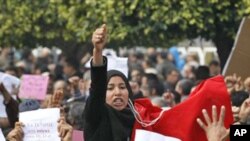Tunisia’s transitional government Wednesday freed all the country’s political prisoners and announced it would go after assets held overseas by former President Zine Al Abidine Ben Ali and his family.
Ellen Lust, associate professor of political science at Yale University in Connecticut told VOA the release of the political prisoners is a welcome development, since most Tunisians feel the prisoners had been unduly punished by the deposed Ben Ali government.
“I think most people, certainly the people in [the] streets, feel that political prisoners in Tunisia were people who have been unduly punished for opposing a regime that they see as equally worst in terms of corruption and human rights,” she said.
Arab League Secretary-General Amr Moussa Wednesday warned Arab leaders at a summit in Egypt that the Middle East is being "broken" by poverty, unemployment and a general slide in economic conditions.
Moussa told Arab leaders the political upheaval in Tunisia is an indicator of spreading discontent in the Middle East. He said the anger of Arab citizens has reached unprecedented levels
Lust said Arab leaders find their backs against the wall in the wake of the Tunisian unrest.
“It is actually correct that the region sees a lot of unemployment, particularly among the youth. It’s not new. I think it is a warning sign to other leaders who hope that they can stem the tide of change. In many ways, they (Arab leaders) are probably more shaken now. One wouldn’t have thought that this can happen in Tunisia. So, this is a strong warning throughout the region,” Lust said.
She said leaders and citizens throughout the Middle East region are probably looking at the Tunisian unrest and realizing that the people are much more powerful than they have been.





